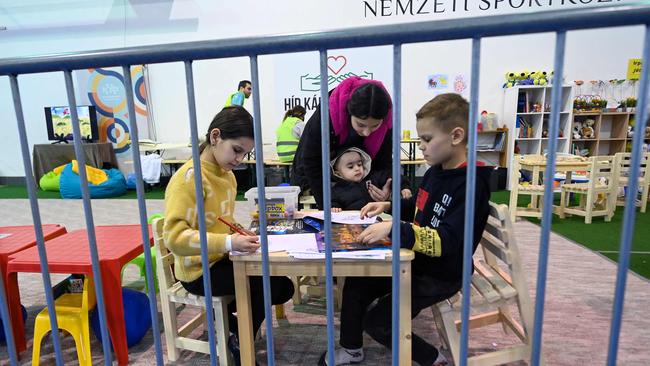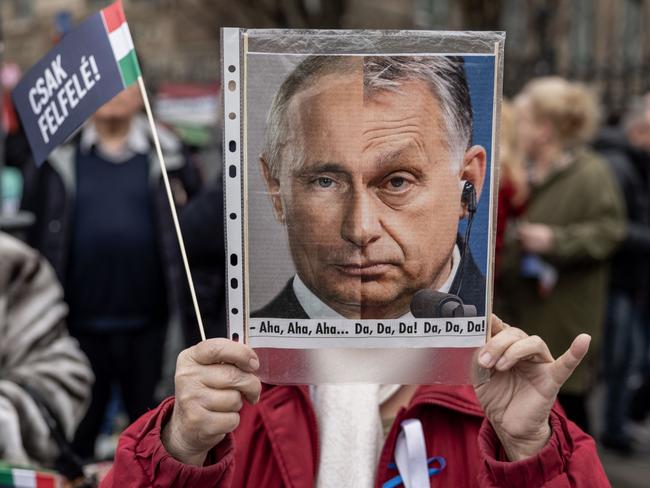Culture war turns to military one as Hungary’s election battle looms
With war on their border, many Hungarians fear a change of rule. A palpable mood of insecurity pervades the region.

A mixture of anxiety, despair and hope is painted on the faces of the Ukrainian refugees as they queue up in front of the Help Tent, opposite the Budapest western railway station.
In perfect English, a middle-aged Ukrainian woman, clasping her violin case, asks me if I know the way to the Canadian embassy. I am about to apologise for not knowing the whereabouts of the embassy, before a Hungarian teenager interjects and volunteers to show its location on the Google Map on her phone.
Two teenage boys approach me when they see me taking notes. One of them explains, “Tell them that it is not just about our freedom but that it is also personal.”
It is also very personal for me. That is why after mixing with the crowd and listening to people recount their plight, I feel a strange sense of deja vu. Not just because I am bearing witness to the unfolding human tragedy but because of the realisation that I have been here before.
I was nine when the Soviet army crushed the 1956 Hungarian Revolution. My family was forced to flee our home and cross the border to Austria. Rather naively in the decades to follow, we came to believe that finally we had entered an era of peace. Now it feels like the bad old days have returned to haunt Ukraine and the surrounding region. Yet again, a palpable mood of insecurity appears to pervade the region.
When I chat to elderly Hungarians about Russia’s invasion of Ukraine, I often get treated to a history lesson. In a tone of resignation, Marton, an 86-year old pensioner who grew up in a Magyar community on the Ukrainian side of the border, reminds me that ever since the Russian army helped crush the Hungarian Revolutionary War for Independence in 1848 “we have always lived under the shadow of war”. He adds: “The Russians came for us in 1956 and who knows when all this will stop.” His friend Csaba interrupts with a chilling reminder: “History never goes to sleep.” No wonder that yet again, many elderly Hungarians fear that history may repeat itself at the expense of their nation’s security.

The crisis in Ukraine has erupted in the middle of an intensely polarised and bitter election in Hungary. Even before the invasion of Ukraine, the campaign which will lead to the election of a new government on April 3 has been subject to considerable international pressure. The leaders of the EU intensely dislike the government of Viktor Orban and have invested their hope in a coalition of six opposition parties led by Peter Marki-Zay, its prime ministerial candidate. Sections of the Western media echo this sentiment and in recent weeks Marki-Zay has been frequently portrayed as the Great White Hope of the liberal establishment who will put Orban in his place.
From the standpoint of the EU establishment, Orban is the bad boy of Europe. He is denounced as a serial rule breaker, who will not allow the EU’s federalist project to stand in the way of his pursuit of policies that he believes are consistent with Hungary’s national interest.
The Hungarian government’s affirmation of the principle of national sovereignty directly contradicts the federalist aspirations of the EU’s establishment. At the same time there is an apparently irreconcilable cultural divide between the conservative values promoted by the Hungarian government on issues such as family and gender politics and the gender-neutral outlook promoted by EU institutions.
With the invasion of Ukraine the electoral battle has shifted from the culture war to the military one that erupted on Hungary’s border. The conservative government headed by Orban has adopted the policy of providing a safe haven for Ukrainian refugees. So far it has welcomed nearly 300,000 refugees and has plans to absorb hundreds of thousands more.
Hungary’s policy of providing a safe haven for refugees runs in parallel with its determination not to get dragged into the conflict between Russia and Ukraine.
At a recent peace rally, Orban told the crowd: “We must stay out of this war! Not a single Hungarian must be caught between the Ukrainian anvil and the Russian sledgehammer.”
The government has denounced the Russian invasion and supports NATO’s reluctance to intervene militarily. Hungarian Foreign Minister Peter Szijjarto said: “We will stand by NATO’s common position and reject proposals that risk either an air war or an extended war on the ground.”
The opposition – consisting of six parties from the left to the far right – has decided to politicise the war by declaring that they represent the enlightened West while the government looks to the East. It has adopted an aggressive posture against Russia and promotes the message that Hungarians must “choose the West over the East” when they head to the polls.
The not-so-subtle implication of this message is that the opposition represents the outlook of the EU while the Prime Minister is Putin’s puppet.
Some opposition politicians have gone so far as to suggest that Hungary should provide active military support to the Ukrainians. At times they come across as more NATO than NATO and more EU than the EU.
Marki-Zay’s adoption of bellicose tone towards Russia and his attempt to present himself as the favourite son of the EU has not improved the electoral standing of the opposition parties.
According to recent polls, the Fidesz government of Orban is ahead of the opposition by 3 to 5 per cent. This is a remarkable feat for a government that has been in power since 2010.

Talking to Hungarians of all ages, it seems that the government’s determination to refrain from intervening in the war resonates with the public.
Opinion polls show that most Hungarians blame Russia for the war and feel a sense of solidarity with Ukraine and welcome the entry of refugees. However, the majority support Orban’s strategy of ensuring that maintaining the country’s security is the main priority.
Ildiko, a 36-year-old administrator and mother of two young children from Gyor, sums up the outlook of the majority of Fidesz supporters: “We will do all that we can to support the refugees but whether we like it or not, a small nation like ours has no choice but to learn to live with Russia.”
Supporters of the opposition believe the tactic of portraying the Prime Minister as a would-be Putin could gain them support among Hungarians who are instinctively suspicious of the motives of the Russian Bear.
Pista is a young university lecturer from Budapest and a fervent opponent of the Orban government. He hopes that by “playing the Western card” people’s natural sympathy for the people of Ukraine could be channelled into votes for the opposition.
The most fascinating feature of this election campaign is the spontaneous manner that the culture war between the EU and Hungary has seamlessly interweaved with a military war on the other side of the border.
After listening to people’s different opinions on the impact of the war on the election campaign, I am reminded of the polarised political landscape that prevailed during the campaign for Brexit. London “Remainers” bear a strong resemblance to Budapest oppositionists looking for salvation from the EU. Outside of Budapest, like outside of London, it is a different world. In Britain as in Hungary they take their national sovereignty seriously.
It is more than likely that on April 3 Orban will be elected as Prime Minister.
Despite the unprecedented unity among opposition parties, this coalition will find it difficult to dislodge him. People’s desire for peace and security is likely to trump the opposition’s appeals to “choose the West”.
But there is also a more compelling reason the opposition has made an error in opting to become the party of war. As Csaba reminds us, in Hungary history never goes to sleep. The fear of insecurity and of war remains integral to the consciousness of a nation that has been occupied by numerous foreign troops throughout the 20th century. The view that “whatever happens, it will not end well” is the conclusion drawn by many Hungarians who remember their history.
Frank Furedi is a professor of sociology at the University of Kent. His latest book, 100 Years of Identity Crisis: The Culture War Over Socialisation, is published by De Gruyter.






To join the conversation, please log in. Don't have an account? Register
Join the conversation, you are commenting as Logout